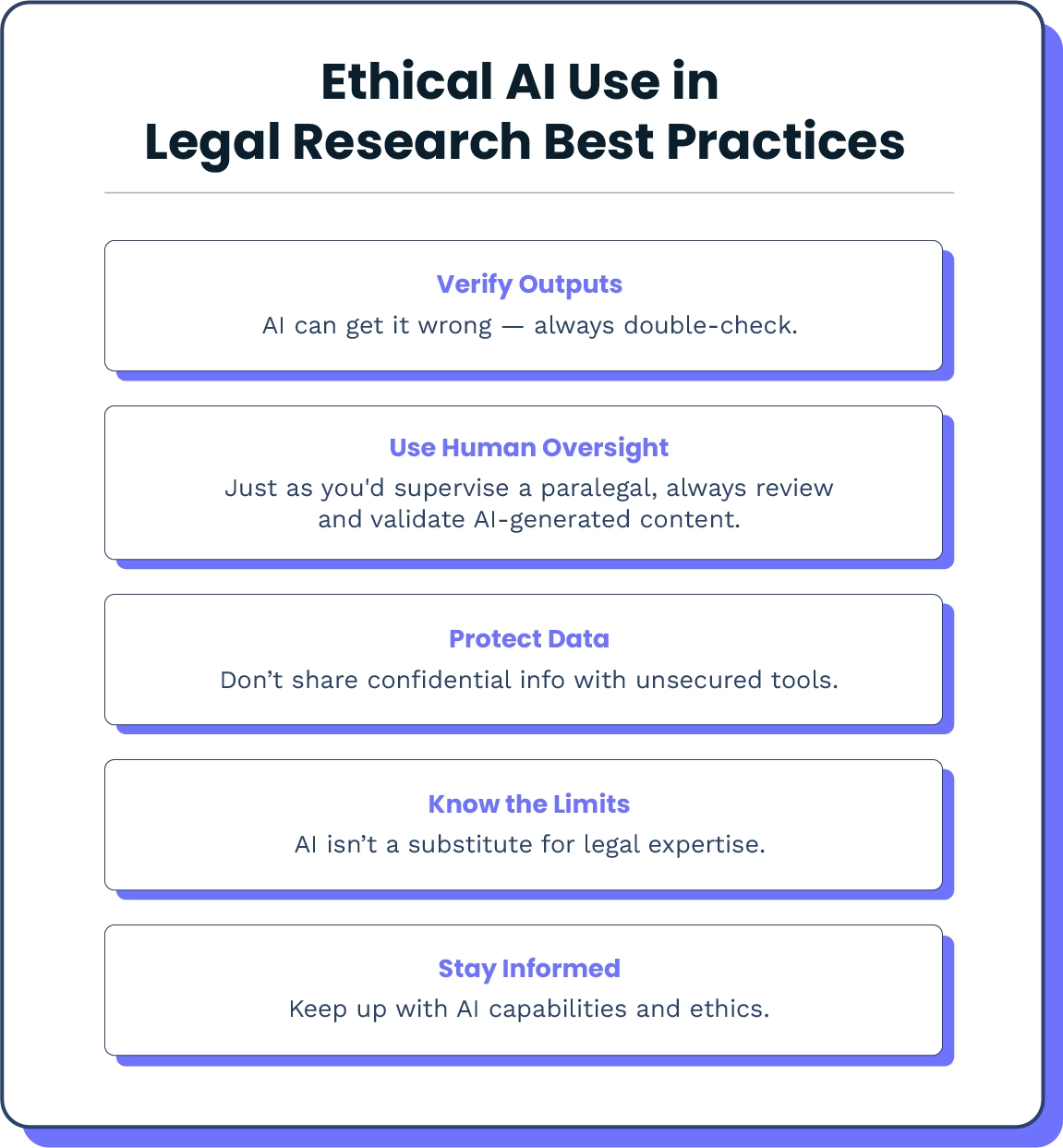Imagine reclaiming the hours you spend sifting through dense legal texts, or quickly uncovering key precedents that might otherwise go unnoticed. For legal professionals, this isn't a distant dream—it's the promise of AI in legal research today.
AI is now a practical, transformative force. It's fundamentally reshaping how firms handle everything from locating case law to ensuring compliance. This shift offers a clear path to improved efficiency and accuracy, empowering lawyers to focus on higher-value work.
However, using AI for legal research comes with responsibilities. AI legal research tools demand careful consideration regarding ethical challenges, data privacy concerns, and the need for ongoing human oversight.
This article offers a practical guide to integrating AI into your legal research workflows, helping you navigate the advantages and challenges of AI in today's evolving legal landscape.
For more insights across everything from AI ethics to legal research to firm productivity, explore our AI for Law Firms Resource Center for the full library of expert articles.
What Are AI Legal Research Tools?
Attorneys use AI legal research tools to analyze vast amounts of case law, statutes, and documents with greater speed and context awareness compared to traditional research methods.
It's important to understand the distinction between legal-specific AI tools, like Westlaw Edge or LexisNexis, and free generative AI chatbots, such as ChatGPT. The key difference lies in their specialization: legal AI tools are rigorously trained on extensive legal datasets, whereas generative AI chatbots are built on broad internet data and are not specialized for legal accuracy.
Because of this, legal-specific AI tools are the recommended choice for producing more accurate, relevant results in legal work.
How Do Lawyers Use AI for Legal Research?
Lawyers are increasingly integrating AI into their daily workflows to improve how they conduct legal research. AI legal research tools empower legal professionals to search case law, surface relevant precedents, and analyze judicial trends with unparalleled speed and precision. This helps attorneys quickly identify patterns and build stronger arguments based on comprehensive data analysis.
Beyond search functionality, AI can significantly boost accuracy. These tools can identify missing citations, summarize complex rulings into clear overviews, and even predict likely outcomes through advanced litigation analytics.
Ultimately, by leveraging AI for legal documents, lawyers can ensure the integrity of their research.
Top AI Tools for Legal Research (2025 Edition)
The market for AI legal research tools is growing fast, with many platforms offering unique features for different needs. Here are some of the best AI tools for legal research in 2025:
1. Lex Machina
Lex Machina is a legal analytics platform that provides data-driven insights on judges, opposing lawyers, and other key topics. It offers predictive analytics on litigation outcomes, helping to improve case strategies by showing past court behaviors and results. Lex Machina is ideal for litigators, as its key strength is its detailed litigation data and deep analysis of court records.
2. vLex
vLex is a legal intelligence platform that combines vast legal information with AI-powered search. It gives lawyers access to an extensive collection of case law and statutes from over 17 countries. Its AI features, like machine translation and smart document linking, speed up research and insight generation for international cases. vLex is excellent for firms with global practices, standing out with its wide global content and advanced AI.
3. Westlaw Edge
Westlaw Edge, from Thomson Reuters, is a leading AI legal research platform known for advanced search, litigation analytics, and document analysis. Features like "KeyCite Flag" for checking citations, "Quick Check" for analyzing briefs, and "Litigation Analytics" offer deep insights into judges and opposing counsel. Westlaw Edge suits a wide range of U.S. legal professionals, providing a strong set of integrated AI tools that make research more efficient and accurate.
4. Bloomberg Law AI Tools
Bloomberg Law integrates AI for predictive insights, document analysis, and research across its legal and business information platform. Lawyers benefit from features like Points of Law for quick issue identification and Draft Analyzer for reviewing and comparing contracts. It's well-suited for corporate and transactional attorneys, as well as litigators, its main strength being the seamless integration of legal research with comprehensive business and financial data.
5. Thomson Reuters CoCounsel
Thomson Reuters CoCounsel offers generative AI tools for tasks from research to writing. It helps lawyers with content summaries, clause analysis, and drafting, significantly boosting efficiency. This tool is best for legal professionals needing a comprehensive AI assistant for complex tasks. Its broad application of generative AI across the legal workflow sets it apart from other solutions.
6. Free Generative AI Chatbots
Tools like ChatGPT, Claude, and Gemini can aid preliminary brainstorming as free AI chatbots for legal research. However, extreme caution is crucial. These general-purpose tools are not built for legal-specific applications. They may rely on outdated data, and their functionality for legal research is significantly limited. Because of this, you should never rely on them for definitive legal advice or case preparation without thorough independent verification and understanding their inherent limitations.
Key Product Features of AI Legal Research Tools
Using specific AI product features for legal research can help improve the efficiency and depth of case preparation. These platforms go beyond simple keyword searches, offering advanced functions that redefine how attorneys work with large amounts of information.
Top AI tools for legal research typically offer features like:
Natural Language Search (NLS): Allows users to pose complex questions in plain English, making research more intuitive.
Citation Analysis: Automatically verifies citation validity, flagging overruled cases or negative treatment.
Predictive Litigation Analytics: Uses past case data to forecast outcomes and estimate damages.
Document Summarization: AI quickly condenses legal research, saving significant review time.
Smart Filtering: Enables precise filtering of results by jurisdiction, court, date, or specific legal issues.
Jurisdiction-Specific Insights: Provides tailored nuances relevant to a particular jurisdiction, ensuring contextually accurate research.
Some platforms offer free AI tools for legal research, but a paid subscription may be required to access more advanced features. For firms aiming to stay ahead, the benefits of these features often justify the investment.
Best Practices for Using AI Ethically in Legal Research
Using AI for legal research comes with significant ethical responsibilities. Key best practices include:
Verify AI-Generated Outputs: Always verify all AI outputs (citations, summaries, and arguments) before use. AI can "hallucinate" or provide inaccurate information.
Human Oversight: ABA and state bar guidelines require human oversight of non-lawyer assistants; AI tools are similar. Outputs must be reviewed and validated by a qualified legal professional.
Prioritize Data Privacy: Avoid inputting confidential client information or sensitive case details into AI tools, especially platforms offering free AI for legal research, which may retain or reuse prompts. Ensure platforms adhere to strict security protocols.
Understand Tool Limitations: General-purpose AI chatbots lack legal expertise, making them unsuitable for definitive legal advice.
Continuous Learning: Legal professionals must commit to continuous learning regarding AI capabilities, limitations, and ethical implications.
These best practices lay the foundation for ethical AI for lawyers, which is essential for protecting your firm from professional liability and ethical breaches.

Make AI Work for Your Legal Practice With MyCase
Used thoughtfully, AI legal research tools are transformative assets. They enhance research, boost efficiency, and help lawyers deliver greater client value. The use of AI in law extends beyond research—it unlocks opportunities to optimize your entire legal workflow, from text editing to document review. Leading legal AI companies offer a range of solutions that seamlessly integrate with firmwide systems and processes.
MyCase IQ includes built-in AI tools that help lawyers edit communications, summarize notes, and work more efficiently within their familiar case management platform. These features enhance productivity while keeping sound legal judgment at the forefront. MyCase provides innovative legal technology that supports firms in a digital-first landscape, valuing both efficiency and ethical AI use.
Ready to explore how MyCase IQ can enhance your legal practice? Book a demo today!
For a breakdown of the top platforms powering AI research and automation, visit 12 Best Legal AI Tools to Improve Firm Productivity.
AI for Legal Research FAQs
About the author
Gabriela is a creative and results-driven SEO specialist dedicated to helping small businesses and professional service firms excel online. She leverages over six years of digital marketing experience to provide in-depth, authoritative content required for regulated industries like accounting and legal technology. Her work focuses on bridging complex financial and compliance topics with clear, actionable guidance. The core aim of her content is to deliver compliant, data-driven strategies that help practitioners streamline their operations, maximize firm cash flow, and grow their online presence.

